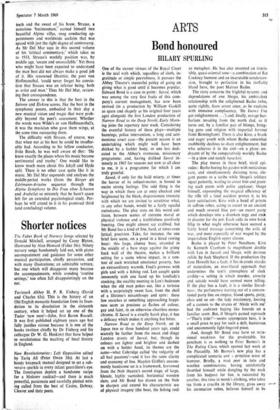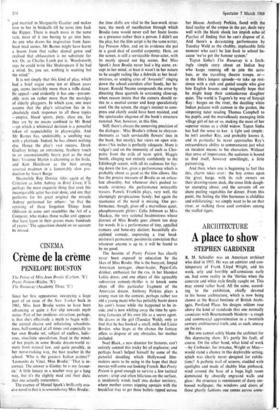Bond honoured ARTS
HILARY SPURLING
One of the sterner virtues of the Royal Court is the zeal with which, regardless of sloth, in- gratitude or simple peevishness, it pursues the Abbey Theatre's masterful policy of going on giving what is good until it becomes popular.
Edward Bond is a case in point: Saved, which was among the very first fruits of this com- pany's current management, has now been revived (in a production by William Caskill as spare and shapely as his original four years ago) alongside the first London production of Narrow Road to the Deep North; Early Morn- ing joins the repertory next week. Considering the eventful history of these plays—multiple bannings, police intervention, a long and acri- monious court case—the present season is an undertaking which might well have been shirked by a feebler body, or one less dedi-
cated to the Abbey's strenuous, missionary programme; and, having disliked Saved in-
tensely in 1965 for reasons not now at all clear to me, it is a programme for which I am truly grateful.
Saved, if only for the bald misery, at times the horror of its subject-matter, is bound to excite strong feelings. The odd thing is the way in which these are at once checked and heightened by the bleak, dispassionate intensity with which we are invited to scrutinise what, in any other hands, would be a fairly squalid melodrama. The play rests on this weird col- lision, between scenes of extreme moral or physical violence and a truthfulness positively freezing. One might almost say crabbed, but Mr Bond has a kind of fine, hard, at times even lyrical, precision. Take, for instance, the one brief love scene, on a pond in a hired rowing boat: this large, clumsy boat, stranded in the middle of a bare stage against the grimy back wall of the theatre, makes a brilliant setting for a scene whose impact, in a con- text of such wretched emotional poverty, has an extraordinary warmth. Fred's prowess with girls and with a fishing rod, Len caught quite innocently with one hand up his landlady's stocking, the stealthy meeting in Len's bedroom when the old man pokes out, like a tortoise with a surprisingly sweet face, from the shell of a lifetime's misanthropy and spite: these few snatches at something approaching happi- ness seem as precious as flashes of colour, gay and faint, in an otherwise cheerless mono- chrome. If Saved is a cruelly harsh play, it has a delicacy which makes it anything but bitter.
Narrow Road to the Deep North, set in Japan two or three hundred years ago, could scarcely be farther from the mean and dingy London streets of Saved; but, though its colours are lighter and brighter and dashed on with a bolder hand, its themes are the same—what Coleridge called `the vulgarity of all bad passions'—and it has the same clarity and economy of line. Hayden Griffin's uncom- monly handsome set is a framework, borrowed from the Nob theatre's sacred stage, of large, blonde, highly varnished, horizontal wooden slats; and Mr Bond has drawn on the Nob to sharpen and extend his characteristic use of physical imagery (the boat, the fishing rod)
as metaphor. He has also invented an irresis- tible, quasi-oriental tone—a combination of flat Cockney humour and an inscrutable condescen- sion, brought to perfection in his ineffably bland hero, the poet Matsu° Basho.
The story concerns the frightful tyranny and depredations of one Shogo, his ambivalent relationship with the enlightened Basho (who, quite rightly, fears arrest since, as he explains with immense complacency. 'He knows I've
got enlightenment . ..') and, finally, savage bar- barians invading from the north (led, as it
turns out, by a familiar pair of blimps, bring- ing guns and religion with impartial fervour from Birmingham). There is also Kiro, a brash and eager youth with whom Basho somewhat snobbishly declines so share enlightenment, but who achieves it in the end—on a plane un- dreamt of by the comparatively worldly Basho —in a slow and stately hara-kiri.
The play moves in these brief, vivid epi- sodes: Basho hoeing his garden with meticulous care, and simultaneously dictating terse, de- kint poems to a scribe while Shogo's soldiers squat patiently, waiting to arrest him and greet- ing each poem with polite applause; Shogo himself, expounding the magical efficiency of the rifle till a fatal accident proves it, to his keen satisfaction; Kiro with a band of priests in saffron robes, acting as escort to an ancient and much revered blue pot—an escort party which develops into a drunken orgy and end; in disaster for the pot. Each adds its own brisk fillip to what might otherwise have seemed a fairly banal message concerning the evils of war, and most especially of war waged by the imperialistic English upper classes.
Basho is played by Peter Needham, Kiro by Kenneth Cranham (a magnificent double with Len in Saved) and Shogo, with devious relish, by Jack Shepherd. If the production (by Jane Howell) has a fault, it lies in crude streaks of naturalism, an over-literal approach that undermines the text's atmosphere of sleek civility—a setting in which murder, atrocity and suicide would have seemed more telling. If the play has a fault, it is a similar literal- ness: the perfunctory trotting out of a conven- tional party line on empire, blood sports, piety, class and so on—the lady missionary, loosing off a cannon to the strains of 'Abide with me' had the audience baying like hounds on a familiar scent. But, if Shogo's pained reproach —That's trite!'—seems appropriate here, it is a small price to pay for such a deft, humorous and uncommonly light-fingered piece.
And, though Mr Bond may have an occa- sional weakness for the predictable, his penchant is as nothing to Peter Barnes's in The Ruling Class, which opened last week at the Piccadilly. Mr Barnes's new play has a complicated scenario and 4 primitive sense of humour. Briefly, a mad peer in tutu and woollen combinations, having accidentally throttled himself while dangling by the neck from his bedpost for fun, is succeeded by another, this time in monk's clothing, who takes tea from a crucifix in the library, gives away his coronation robes, believes himself to be god married to Marguerite Gautier and makes love to her in birdcalls till he turns into Jack the Ripper. There is much more in the same vein, most of it too boring to go into here. As one who draws his inspiration from Jaco- bean mad scenes, Mr Barnes might have learnt a lesson from that rather dismal genre and" realised that obfuscation is no substitute for wit. Or, as Charles Lamb put it, 'Wordsworth. says he could write like Shakespeare if he had a mind. So, you see, nothing is wanting but the mind.'
It is not simply that this kind of play, which had a brief vogue some ten or fifteen years ago, seems inevitably more than a trifle dated. Its appeal—and evidently it has one—presum- ably rests on rather more than the nostalgia of elderly playgoers. In which case, one must assume that the play's attraction lies in its absolutely stock responses to all those topics —empire, blood sports, piety, class etc, for they are by no means confined to Mr Bond —con which a whimsical derision is a powerful token of respectability in playwrights. And Mr Barnes has, undeniably, a soothing way with a platitude. Indeed, he has almost nothing else. Hence the play's vast success. Derek Godfrey brings an entrancing, feathery touch to an unconscionably heavy part as the mad heir; Vivienne Martin is charming as his bride, and Ken Hutchison as the best among assorted madmen in a lamentably slow pro- duction by Stuart Burge.
Meanwhile Roy Dotrice rides again at the Criterion as John Aubrey in Brief Lives; it is perhaps the most exquisite thing that even this incomparable actor has ever done, and one that performs for his great original the miracle Aubrey performed for others: `so that the retriving of these forgotten Things from Oblivion in some sort resembles the Art of a Conjuror, who makes those walke and appeare that have layen in their graves many hundreds of yeares.' The apparition should on no account be missed.



































 Previous page
Previous page